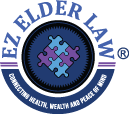
When applying for Medicaid, the nursing home spouse (called the Institutionalized Spouse) is often a joint owner (or sole owner) on checking, savings and other acounts. Should those resource be taken out of the name of the Institutionalized Spouse? The answer is generally “yes,” but it requires some context and some qualifications. The context and […]

